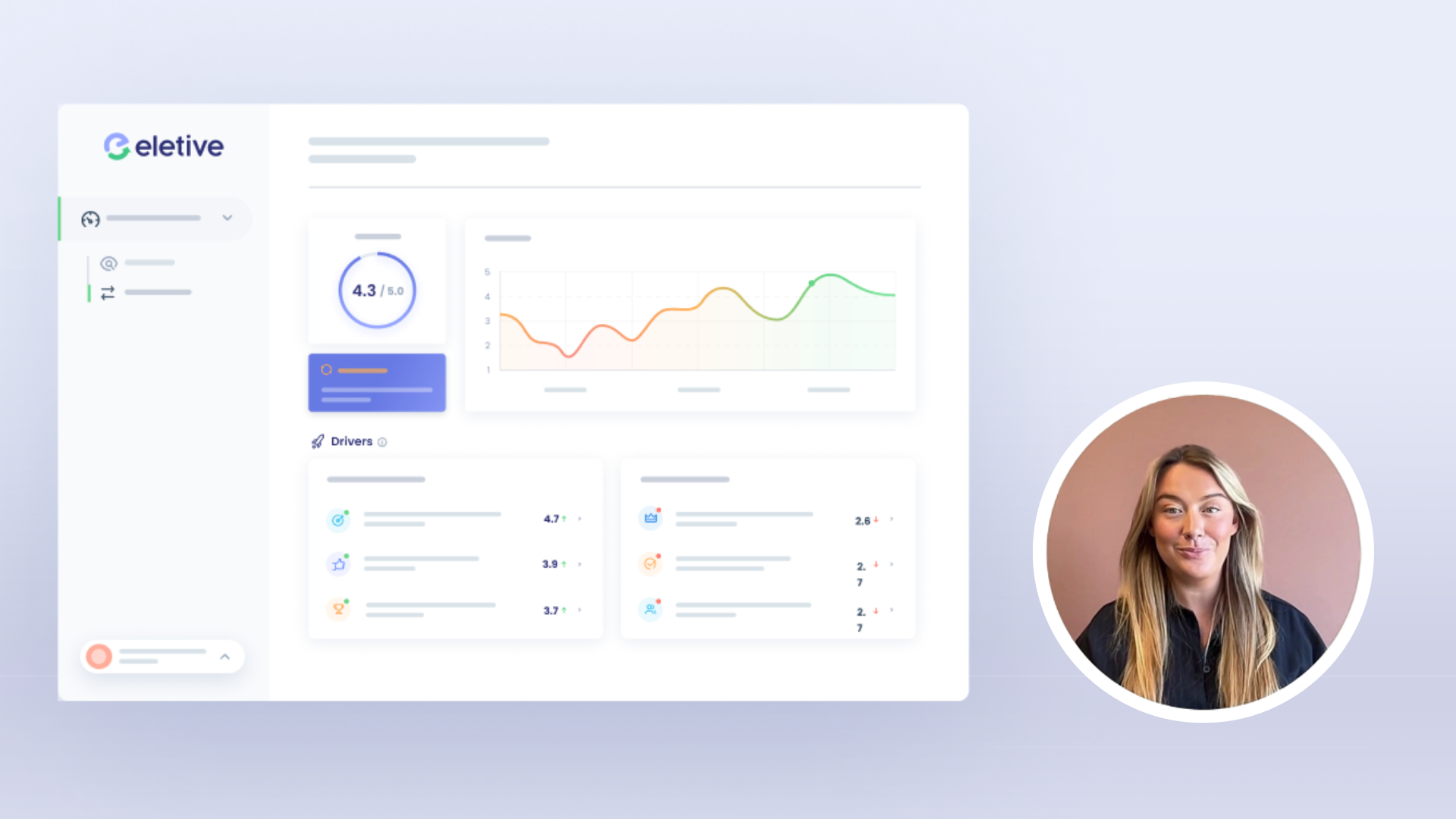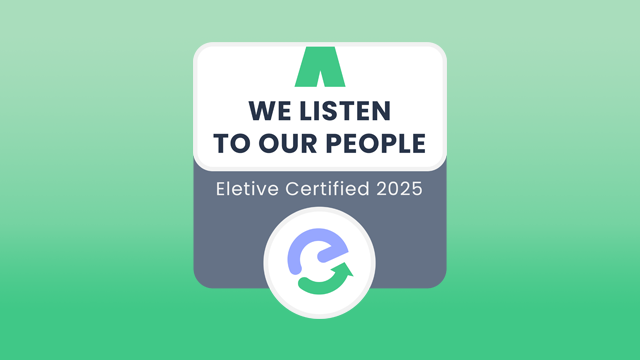In this webinar, Marie Rockström, HR-digitalisation expert from HerbertNathan & Co deep-dives into the business impact of engagement, and the "moments that matter" approach to building a great employee experience.
The following topics are the foundation of the webinar:
The link between employee engagement, customer experience, and business outcomes
The essential elements of engagement
The role of touch points and how to use them to drive engagement
How to create “moments that matter” in the employee experience
Global business case data related to engagement
Professional, personal, and emotional experiences related to engagement
Marie Rockström has 15 years of experience within HR
She is positive that engaged employees impact business results
With over 15 years of experience in the HR field in roles such as HR Manager, Personnel & Payroll Manager, and HR Specialist, Marie has worked in many different industries and cultures. She has worked as a project leader for numerous system implementations and other digitalisation initiatives. This is how she stumbled upon her calling: HR tech and digitalisation. Her interest in both technology and people has led her to drive several successful digitalisation projects within HR.
She believes that strong HR processes are essential for any organisation looking to create a strong employer brand and a high level of employee engagement. To demonstrate this, Marie illustrated case studies and data that showed that 70% of engaged employees were promoters of the business, versus just 13% of disengaged employees. Hence, HR processes are a powerful tool for improving the employer brand.
70% of the engaged employees are promoters of your business and are speaking well of you as an employer, but also speaking well about the brand and the product you're creating. So if you're looking to improve your employer brand, this is one of the best things.- Marie Rockström, Senior Manager HRIT.
Services from Herbert Nathan & Co
How can employee engagement impact business results?
Yes, employee engagement can have a significant impact on business results. Studies have shown that businesses with highly engaged employees have:
Higher customer satisfaction
Higher productivity
Higher profitability
Lower employee turnover.
Employee engagement also contributes to stronger employer brand recognition and greater employee loyalty. By providing employees with the tools and support they need, businesses can ensure they have a highly productive and motivated workforce.
Some global business facts about the impact of employee engagement
The importance of employee engagement cannot be overstated. Companies that invest in employee engagement are not only rewarded with improved performance but also with a greater sense of loyalty and respect from their employees. Globally you find the following metrics:
52% gap in operating income between companies with the most and least engaged employees
78% of engaged employees are promoters of vs 13% of disengaged employees
Costs between 25- 100% of salary to replace a leaver and 20 weeks for a knowledge worker to be ready
The average absence rate is 2,69 days average a year, and disengaged employees 6.19
By providing employees with the right tools and support, businesses can ensure that their employees are motivated and productive, leading to increased customer satisfaction, improved profitability, and lower employee turnover.
Read more on the business cases
To increase employee engagement you need to map the experience
Creating meaningful experiences by influencing the employee's emotions at certain points is according to Marie Rockström the most efficient way to improve employee engagement.
Different touch points create the experience, and the emotional connection to these will in turn increase or decrease employee engagement. So what is the actual difference between employee engagement and employee experience?
Two women discussing how to implement a 360 feedback system:format(jpeg)/f/288714721386412/83c6ac0568/blog_graphics__presentation__169____1280____720_px___7_.jpg)
Employee Experience
Refers to the total of an employee's interactions with their organisation, including their physical work environment, the tools, and technology they use, their relationship with their managers and colleagues, the company culture, and the policies and procedures that govern their work.
Employee Experience is the overall journey of the employee from pre-hire to post-exit. It includes all the touchpoints that the employee has with the organisation, from the time they first learn about the company, to the onboarding process and the day-to-day work experience. It encompasses all the interactions that the employee has with the organisation, its people, products, services, and processes. It is the sum of all the experiences that the employee has with the organisation, and how those experiences shape their relationship with the company. A positive employee experience will lead to increased employee engagement, while a negative experience will lead to decreased engagement.
Employee Engagement
Employee engagement refers to the level of emotional connection, motivation, and commitment that employees have toward their work, their organization, and its goals. It measures how invested employees are in their jobs and how much effort they are willing to put in to achieve the company's objectives. Learn how to measure the employee experience
Professional, personal, and emotional employee experiences
Employee engagement and experience are interconnected and both play a critical role in an organisation's success. Employee experience is the foundation for positive employee engagement, as it drives employees to give their best to the organisation. A positive employee experience can lead to increased engagement and performance, as employees feel valued and appreciated, and are motivated to continue contributing to the organisation's success.
Professional experience affecting engagement
Marie Rockström mentions the strategy of the company, the workplace, and how it can affect the culture and individual employee experience. Other professional experiences are the people, products, services, and processes.
Completing a successful project on time and within budget.
Developing new skills or competencies through training or on-the-job learning.
Receiving a promotion or advancement in their career.
Negotiating a salary increase or other employment benefits.
Presenting at a conference or industry event to showcase their expertise and knowledge.
Overcoming a professional setback or failure and learning from the experience.
Managing a team or leading a project to successful completion.
Collaborating with colleagues from different departments or offices to achieve shared goals.
Receiving positive feedback or recognition from customers or clients for excellent service or work.
Implementing new processes or technologies that improve efficiency or effectiveness in the workplace.
Personal experiences affecting engagement
The private sphere is not solely the responsibility of the organization, but it still has an impact on the employee experience. This is because individuals bring their personal lives to work, such as their ambitions and family situations. For example, if someone had a major argument with their spouse before coming into work, it could affect their level of engagement.
Another aspect of the employee experience is their health. If someone receives bad news, they may not be as client-friendly or productive. This presents a leadership challenge in understanding what employees are going through and ensuring that the organization contributes to their overall well-being through their employee experience.
A personal health issue or injury that affects their ability to work or attend work regularly.
Balancing work responsibilities with caring for a young child or elderly family member.
Financial stress or hardship that impacts their ability to meet expenses or make ends meet.
Coping with the loss of a loved one or experiencing a difficult breakup or divorce.
Dealing with a mental health issue such as anxiety or depression that affects their job performance and wellbeing.
Struggling with addiction or substance abuse issues that affect their ability to work and maintain professional relationships.
Managing the demands of work while pursuing further education or professional development.
Adjusting to a new city or country due to relocation for work.
Dealing with discrimination or harassment based on their race, gender, religion, or sexual orientation.
Managing work-life balance while pursuing personal hobbies or interests outside of work.
Emotional experiences affecting employee engagement
There are also emotional experiences that are connected to both personal and professional aspects. The way others treat us or different situations we encounter can trigger certain emotions.
For instance, commuting can be an example of this, as it can cause feelings of stress that may be carried into the workday. Therefore, we bring a broader perspective with us into the workday. While our level of responsibility is often determined by how we perceive our work, our values, emotions, and attitude towards all these touchpoints can also affect our performance during the workday.
In addition, there are other emotional experiences that may arise from work-related situations, such as:
Feeling overworked and stressed due to a heavy workload and tight deadlines.
Frustration and disappointment when a project they put a lot of effort into doesn't meet expectations.
Anger and resentment when they feel unfairly treated or not respected by a coworker or manager.
Anxiety and nervousness before a big presentation or meeting with important clients.
Feeling valued and appreciated when their hard work is recognized and rewarded.
Disappointment and sadness when a coworker or manager they had a good relationship with leaves the company.
Burnout and exhaustion due to a lack of work-life balance and constant pressure to perform.
Feeling challenged and motivated when given a new, exciting project to work on.
Embarrassment and shame when they make a mistake or fail to meet expectations.
Feeling unsupported and unappreciated when they don't receive enough guidance or feedback from their manager.
Learn about the Eletive drivers of enagement
Does oganisations care for emotional and personal experiences?
While not all companies prioritise it, those that care about their employees' professional, personal, and emotional well-being tend to have higher levels of employee engagement. Marie Rockström has yet to find a business case where attending to personal and emotional needs results in lower engagement; in fact, the opposite is usually true.
Here's an example of what supporting personal and emotional experiences can entail:
Marie, I can see you're not feeling well. Have you fought with your husband again? Yes. Okay, I'll take you off the phone and you can sit and go and minister, for example.
Being aware of these types of situations and having empathy for what your employees may be going through can help boost employee engagement. This can be done by providing flexible working hours, allowing employees to take breaks as needed, and providing resources to help employees manage their mental health.
Additionally, creating an environment where employees feel safe to express their feelings and be open about their struggles can provide better morale, leading to higher engagement.
Eletive is a People Success Platform
We gather all the tools you need for measuring and increasing employee engagement and for building a high-performing culture in one user-friendly platform. Our platform includes
Employee engagement:format(jpeg)/f/288714721386412/3594f48d60/la__gg_till_en_underrubrik__1_.jpg)
Employee engagement surveys
Real-time reports & heat maps
Realtime dashboards at all organisational levels
In-app advice for managers and employees
Suggested actions
Performance management tools
1:1 tools & templates
OKRs & SMART goals
360 Surveys
AI & NLP analysis of free-text survey answers
We can help you reach your goals
Our platform is built on a unique and agile approach to engagement that connects employee feedback to actionable insights. What sets us apart is that we don't stop there. We also help you connect those insights to actions, and to measure the impact of your initiatives. With minimum effort and admin, so you can focus on building a workplace where people thrive – and perform at their best.
Explore how Eletive can help you reach your people & business objectives!

























:format(jpeg)/f/288714721386412/23f4213ba9/blog-webinar-the-business-impact-of-employee-engagement-hero_media.jpg)
:format(png)/f/288714721386412/70a5012076/blog-eletive-secures-growth-investment-from-accel-kkr-hero_media.png)
:format(jpeg)/f/288714721386412/a906f14dff/blog-hr-trends-2026-ai-data-and-employee-experience-hero_media.jpg)
:format(png)/f/288714721386412/9f8e0a2347/blog-beyond-the-hype-the-new-rules-of-people-success-in-a-global-ai-powered-hero_media.png)